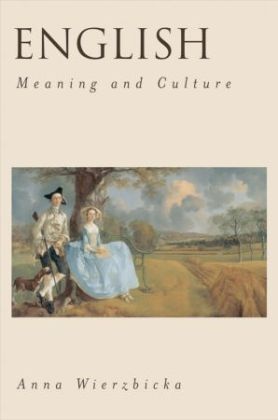Read more
Zusatztext ...this is a great book, one which must be applauded. The strength of the book is to propose a kind of linguistics which takes into account the various, subtle, rich, and extremely interesting interactions between language and cultural scripts. Given that books like this are rare, the author deserves countless words of praise. Informationen zum Autor Anna Wierzbicka is Professor of Linguistics at Australian National University. She has an international reputation for her work on semantics, pragmatics, and cross-cultural linguistics. Other published works include What Did Jesus Mean? (OUP, 2001), Semantics, Culture, and Cognition (OUP, 1992), and Semantic Primitives, in which she is credited with establishing the Natural Semantic Metalanguage. Klappentext It is widely accepted that English is the first truly global language and lingua franca. Its dominance has even led to its use and adaptation by local communities for their own purposes and needs. One might see English in this context as being simply a neutral, universal vehicle for theexpression of local thoughts and ideas. In fact, English words and phrases have embedded in them a wealth of cultural baggage that is invisible to most native speakers. Anna Wierzbicka, a distinguished linguist known for her theories of semantics, has written the first book that connects the Englishlanguage with what she terms "Anglo" culture. Wierzbicka points out that language and culture are not just interconnected, but inseparable. This is evident to non-speakers trying to learn puzzling English expressions. She uses original research to investigate the "universe of meaning" within theEnglish language (both grammar and vocabulary) and places it in historical and geographical perspective. For example, she looks at the history of the terms "right" and "wrong" and how with the influence of the Reformation "right" came to mean "correct." She examines the ideas of "fairness" and"reasonableness" and shows that, far from being cultural universals, they are in fact unique creations of modern English. She does the same to other English words and phrases, as well as dissecting the way English countries like Singapore and Tasmania have embedded their own values into theiradapted versions. This engrossing and fascinating work of scholarship should appeal not only to linguists and others concerned with language and culture, but the large group of scholars studying English and English as asecond language. Zusammenfassung Points out that language and culture are not just interconnected, but inseparable. This work uses research to investigate the "universe of meaning" within the English language and places it in historical and geographical perspective. It is intended for linguists and others concerned with language and culture. Inhaltsverzeichnis Part I. Meaning, History and Culture 1: English as a cultural universe 2: Anglo cultural scripts as seen through Middle Eastern eyes Part II. English words, From Philosophy to everyday discourse 3: The story of RIGHT and WRONG and its cultural implications 4: Being REASONABLE: A key Anglo value and its cultural roots 5: Being FAIR: Another key Anglo value and its cultural underpinnings Part III. Anglo culture reflected in English Grammar 6: The English Causatives: Causation and interpersonal relations 7: I THINK: The rise of epistemic phrases in modern English 8: PROBABLY: English epistemic adverbs and their cultural significance Part IV. Conclusion 9: The "cultural baggage" of English and its significance in the world at large ...

